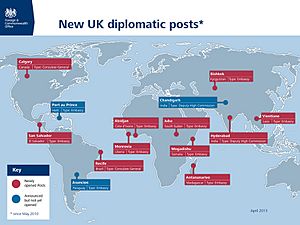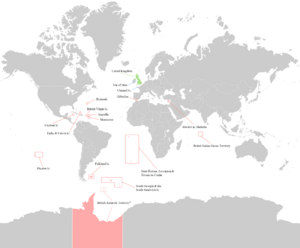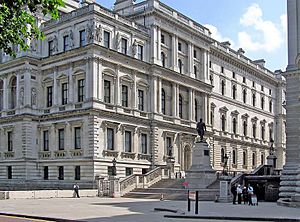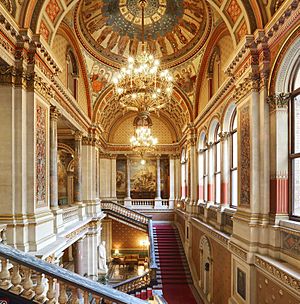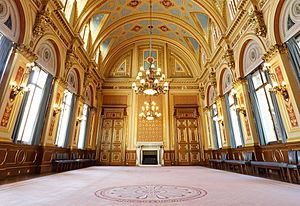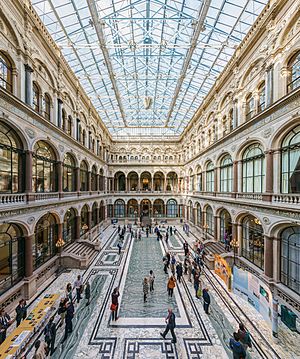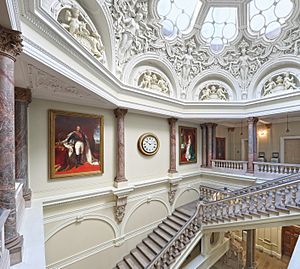Foreign, Commonwealth and Development Office facts for kids
 |
|
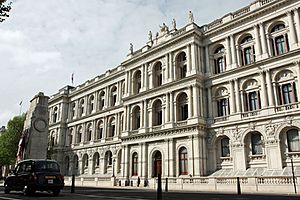 FCDO Main Building, Westminster |
|
| Department overview | |
|---|---|
| Formed | September 2, 2020 (as the Foreign, Commonwealth and Development Office) |
| Preceding agencies |
|
| Jurisdiction | Government of the United Kingdom |
| Headquarters | King Charles Street London SW1 51°30′11″N 0°07′40″W / 51.50306°N 0.12778°W |
| Annual budget | £8.172bn (resource) & £2.759bn (capital) in 2024–25 |
| Secretary of State responsible |
|
| Department executives |
|
| Child agencies |
|
The Foreign, Commonwealth and Development Office (FCDO) is a special department of the government of the United Kingdom. It acts like the UK's main office for dealing with other countries around the world.
This important office was created on 2 September 2020. It brought together two older departments: the Foreign and Commonwealth Office (FCO) and the Department for International Development (DFID). The FCO itself was formed in 1968 by joining the Foreign Office (FO) and the Commonwealth Office. The FCDO's main job is to represent the UK and promote its interests everywhere.
The person in charge of the FCDO is called the Secretary of State for Foreign, Commonwealth and Development Affairs. Most people just call them the "Foreign Secretary." This role is one of the four most important jobs in the UK government's main group of ministers, called the Cabinet. The other top jobs are Prime Minister, Chancellor of the Exchequer (who handles money), and Home Secretary (who deals with things inside the UK). Yvette Cooper became the Foreign Secretary on 5 September 2025.
A senior civil servant manages the FCDO every day. This person is known as the permanent under-secretary of state for foreign affairs. They also lead His Majesty's Diplomatic Service, which is the team of diplomats who work for the UK abroad. Sir Olly Robbins became the permanent under-secretary on 8 January 2025.
A group of Members of Parliament, called the Foreign Affairs Select Committee, checks how the FCDO spends its money and what policies it makes.
Contents
What the FCDO Does
The FCDO has several key responsibilities to help the UK on the world stage. These include:
- Keeping the UK safe by working against terrorism and stopping the spread of dangerous weapons. They also help reduce conflicts around the world.
- Helping the UK's economy grow by encouraging more exports and investments. They work to open up new markets and ensure the UK has access to important resources. They also promote global growth that lasts a long time.
- Supporting British citizens who are living or traveling in other countries. They provide helpful services to people abroad.
The FCDO also looks after the British Overseas Territories. These are places like Gibraltar or the Falkland Islands that are connected to the UK. Over time, different government departments have been responsible for these territories. The FCDO now handles these relationships.
FCDO Ministers
Here are some of the important ministers who work at the FCDO:
| Minister | Portrait | Office | Portfolio |
|---|---|---|---|
| Yvette Cooper MP |  |
Secretary of State for Foreign, Commonwealth and Development Affairs | Leads the entire department and oversees all the other ministers. She is part of the Cabinet and the National Security Council. She also handles overall strategy and intelligence policy. |
| Jenny Chapman, Baroness Chapman of Darlington |  |
Minister of State for International Development, Latin America and Caribbean | Focuses on international development, especially in the Caribbean and Small Island Developing States. She also works on "soft power," which means promoting the UK's culture and values through groups like the British Council. |
| Stephen Doughty MP |  |
Minister of State for Europe, North America and Overseas Territories | Deals with countries in Europe, Central Asia, the US, and Canada. He also looks after the British Overseas Territories and polar regions. His work includes security groups like NATO. |
| Catherine West MP |  |
Parliamentary Under-Secretary of State for Indo-Pacific | Covers countries in India, China, Southeast Asia, and the Pacific. She also focuses on economic security, growth, technology, and how the department runs. |
| Hamish Falconer MP |  |
Parliamentary Under-Secretary of State for the Middle East, Afghanistan and Pakistan | Works with countries in the Middle East, North Africa, Afghanistan, and Pakistan. He also helps with consular services and crisis operations for British citizens. |
| Ray Collins, Baron Collins of Highbury |  |
Parliamentary Under-Secretary of State for Africa | Focuses on all parts of Africa and works with the African Union. He also deals with international organizations like the United Nations and human rights issues. |
A Brief History of the FCDO
| Northern Department 1660–1782 Secretaries — Undersecretaries |
Southern Department 1660–1768 Secretaries — Undersecretaries |
— | |
| Colonial Office 1768–1782 Secretaries — Undersecretaries |
Southern Department 1768–1782 Secretaries — Undersecretaries |
||
| Foreign Office 1782–1968 Secretaries — Ministers — Undersecretaries |
Home Office 1782–1794 Secretaries — Undersecretaries |
||
| War Office 1794–1801 Secretaries — Undersecretaries |
|||
| War and Colonial Office 1801–1854 Secretaries — Undersecretaries |
|||
| Colonial Office 1854–1925 Secretaries — Undersecretaries |
India Office 1858–1937 Secretaries — Undersecretaries |
||
| Colonial Office 1925–1966 Secretaries — Ministers — Undersecretaries |
Dominions Office 1925–1947 Secretaries — Undersecretaries |
India Office and Burma Office 1937–1947 Secretaries — Undersecretaries |
|
| Commonwealth Relations Office 1947–1966 Secretaries — Ministers — Undersecretaries |
|||
| Commonwealth Office 1966–1968 Secretaries — Ministers — Undersecretaries |
|||
| Foreign and Commonwealth Office 1968–2020 Secretaries — Ministers — Undersecretaries |
|||
| Foreign, Commonwealth and Development Office Since 2020 Secretaries — Ministers — Undersecretaries |
|||
How the Foreign Office Started
The Foreign Office began in March 1782. Before that, two different government departments handled both foreign and local matters. These two departments were combined to create the Foreign Office, which focused only on international affairs. The parts that dealt with local matters became the Home Office.
The Foreign Office in the 19th Century
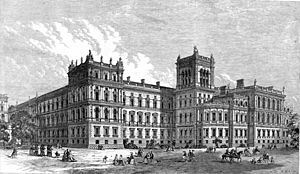
During the 1800s, the Foreign Office sometimes asked newspapers like The Times for information about other countries. This was because journalists often had very good connections and knew a lot about what was happening abroad.
The Foreign Office in the 20th Century
During the First World War, a special group called the Arab Bureau was set up within the Foreign Office. Its job was to gather information in the Middle East. Later, in 1922, the Government Code and Cypher School, which works on secret codes, moved to the Foreign Office. In 1946, the Foreign Office hired its first woman diplomat, Monica Milne.
The Foreign and Commonwealth Office (1968–2020)
On 17 October 1968, the Foreign and Commonwealth Office (FCO) was formed. This happened when the Commonwealth Office and the Foreign Office joined together. The Commonwealth Office itself was quite new, created in 1966 from other mergers.
Between 1970 and 1974, and again from 1979 to 1997, the FCO was also responsible for helping other countries develop. After 1997, a separate department, the Department for International Development, took over this role.
In 2007, David Miliband, who was the Foreign Secretary, reviewed the FCO's main goals. The department decided to focus on three core areas:
- A global network of staff and offices to help the entire UK Government.
- Three key services: supporting the British economy, helping British citizens abroad, and managing migration to Britain. These services were provided through groups like UK Trade & Investment (UKTI) and consular teams.
- Four main policy goals:
- Stopping terrorism and the spread of weapons.
- Preventing and solving conflicts.
- Promoting a global economy that grows well and uses less carbon.
- Helping international organizations, like the United Nations and the European Union, work effectively.
In 2009, a new role was created: the Chief Scientific Adviser to the FCO. The first person in this role was David Clary.
The Foreign, Commonwealth and Development Office (2020–Present)
On 16 June 2020, Prime Minister Boris Johnson announced that the FCO would merge with the Department for International Development. This merger happened in September 2020, creating the Foreign, Commonwealth and Development Office (FCDO). The goal was to make sure that aid money was spent in ways that matched the UK's priorities around the world.
In 2022, the UK Minister for Africa, Vicky Ford, announced a new £74 million plan. This money was to help women entrepreneurs in Nigeria start and grow their businesses.
International Academy
The Diplomatic Academy was created in February 2015. Its purpose was to be a central place for all government workers who deal with international matters to learn and share knowledge. It also helps the department work with universities and other diplomatic groups. When the FCDO was formed in 2020, this institution was renamed the International Academy.
Programme Funds
The FCDO uses its budget to fund projects that match its main goals. This funding includes money for international development and other activities. These funds support many different diplomatic efforts.
The FCDO helps manage two major UK government funds that support the country's security and aid plans:
- The Conflict, Stability and Security Fund (CSSF) – This fund helps reduce risks related to conflict in countries important to the UK.
- The Prosperity Fund – This fund supports economic growth and improvements in countries that partner with the UK.
- The Global Innovation Fund – This fund invests in new ideas that can help people living on very little money each day.
The FCDO also supports several academic programs:
- Chevening scholarships
- Marshall scholarships
- Domestic Programme Fund
- Overseas Territories Environment and Climate Fund (Darwin Plus)
- Science and Innovation Network
Aid Budget Adjustments
In 2021, the UK government adjusted its overseas aid budget. This change meant less funding for some humanitarian efforts and global health programs.
Investments for Climate Resilience
The Global Innovation Fund (GIF) launched a special fund called 'Innovating for Climate Resilience'. This fund supports new ideas to help communities deal with climate change. The FCDO helps support this important initiative.
FCDO Services
FCDO Services is a special agency that helps the FCDO and other government departments. It was set up in April 2006. Its job is to provide important support services, like keeping buildings secure and offering translation help.
FCDO Services works all over the world, in many different countries. They offer services such as "Digital and Cloud" solutions, "Securing your Buildings and Spaces", "Logistics" (moving things), "Translation and Interpreting", and "Technical Security".
This agency is accountable to the Foreign Secretary. It provides secure support to the FCDO, other UK government departments, and even friendly foreign governments. FCDO Services is a public sector organization, but it earns its own money by selling its services. It does not rely on public funding.
FCDO Library and Records
The historical records of the FCO were moved to King’s College London in 2007. This collection includes about 90,000 items, some dating back to the 16th century.
FCDO Buildings
Besides its embassies in other countries, the FCDO has several important buildings in the UK:
- Foreign and Commonwealth Office Main Building, on King Charles Street in Whitehall, London.
- Abercrombie House, in East Kilbride.
- Hanslope Park, near Milton Keynes. This is where FCDO Services and other security departments are located.
- Lancaster House, in St James's, London. This grand mansion is used for hosting important guests and international events.
The Main Building
The main FCDO building is a very old and impressive place in London. It was built between 1861 and 1868. It was designed by the architect George Gilbert Scott. He wanted it to look like a Gothic castle, but the Prime Minister at the time, Lord Palmerston, insisted on a more classical, Italian-style design.
In 1925, important agreements called the Locarno Treaties were signed in this building. These treaties aimed to reduce tensions in Europe. The room where this happened became known as the Locarno Suite.
Over the years, the building became very crowded. In the 1960s, there were plans to knock it down, but many people protested. Because of this, the building was protected as a Grade I listed building in 1970, meaning it is very important historically. From 1978, other government departments moved out, making more space.
The building then went through a huge, 17-year restoration project that finished in 1997. The beautiful Locarno Suite was fully restored for international conferences. Today, you can visit parts of the building during the annual Open House Weekend. In 2014, more work began to make sure all FCDO employees could work together in this one building.
How the UK Works with Other Countries
The UK government in London handles international relations for the entire United Kingdom and its connected territories. However, different parts of the UK, like Scotland or Wales, also have their own offices in places like Europe, the US, and China. These offices help promote their local economies and make sure their interests are considered in the UK's overall foreign policy. Sometimes, ministers from these regions can join international discussions with the UK government.
See also
 In Spanish: Ministerio de Relaciones Exteriores y de la Mancomunidad de Naciones para niños
In Spanish: Ministerio de Relaciones Exteriores y de la Mancomunidad de Naciones para niños
- Foreign and Commonwealth Office Migrated Archives
- Palmerston (cat), a famous cat who used to live at the Foreign and Commonwealth Office
- Office for Conflict, Stabilisation and Mediation
- List of development aid agencies
 | Anna J. Cooper |
 | Mary McLeod Bethune |
 | Lillie Mae Bradford |


